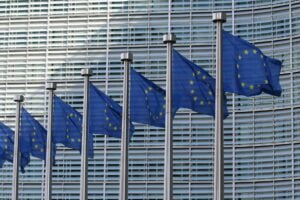This content was created by the Data Sharing Coalition, one of the founding partners of the CoE-DSC.
The Data Sharing Coalition supports organisations with realising use cases at scale to exploit value potential from data sharing and helps organisations to create required trust mechanisms to share data trusted and secure. In our blog section ‘Q&A with’, you learn more about our participants, their thoughts, vision, and ideas about data sharing. Michiel de van der Schueren, Managing Director at Weolcan, shares his thoughts.
1. Could you introduce your organisation?
Weolcan is an independent cloud consultancy firm that supports organisations with their digital transformation to become a digital enterprise. Usually, the aim of this transformation is a new business model based on new IT capabilities (e.g. IoT, ML and AI), new devices (e.g. sensors, robots or wearables) and new data insights. To do so, we start by developing a cloud strategy that addresses the strategic goals of the organisation, as the cloud in most cases is the new toolbox for the digital enterprise. In most cases, data plays an important role in this. After presenting the cloud strategy, we can help implement it. Weolcan focuses on the organisation side of things: organising People & Processes in such a way that not only the applications and data will run in the cloud, but the organisation itself also remains ‘in control’. In control regarding Risk, Security, Compliancy Rules and Budget. For that, we have developed the Weolcan Cloud Governance Framework. By the end of 2021, we merged with Rapid Circle, a renown Microsoft Cloud Partner, that delivers the Cloud Technology our customers need. Our aim was to make our portfolio complete: People – Process – Technology. In the course of 2023, Weolcan will be rebranded into Rapid Circle Advisory.
2. To what extent is your organisation involved in data sharing (within and across sectors)?
In most cases, the digital transformation of our customers is all about implementing a new business model based upon data. We have multiple customer cases where data or data sharing was crucial for their success:
- Lely realised farmers no longer wanted to buy robots to milk their cows. Instead, they wanted a service to look after their cows. Now, Lely not only delivers the Robot as-a-Service, it also launched a new SaaS service which informs the farmers about the robot using predictive maintenance. In addition, farmers can see how much milk each cow produces, whether the cow is healthy and which nutritious supplements they could feed their cows to produce more or higher quality milk. In this case, the farmer is the data owner and Lely retrieves this data from the robots, enriches it with analysis and gives the farmer insights. Watch this video for more information about this smart farm case.
- Portbase was founded by Port of Rotterdam and Port of Amsterdam. It connects all parties in the logistics chains of the Dutch ports. Portbase facilitates data sharing between companies and information exchange with governments via its Port Community System in order to work faster, more efficiently and at lower costs. For Portbase, it became imminent to run their monolithic application on-prem as they could not speed up their software development and software release process. Hence, they needed a cloud strategy to refactor the application into a micro-services based architecture and to implement DevOps automation in order to become a digital enterprise. In September 2018, the new platform went in production on AWS, just in time to facilitate all customs requirements for Brexit. Watch this video for more information about this smart farm case.
Furthermore, from a Rapid Circle point of view, we are involved in various data and/or data sharing projects. For the anDREa Consortium (DRE = Digital Research Environment), we built a data sharing platform which enables scientists of Radboud UMC, Erasmus UMC, Utrecht UMC and Amsterdam UMC to gather and combine their data, do their research and analytics and share the results with scientists across the world. This way of working proved to be of great value during the Corona pandemic, as the scientist were able to securely exchange their data and the results of their research far quicker and more efficiently than ever before, in a compliant way.
3. Why is or should sharing data be important for your industry or domain?
When we help our customers with their digital transformation journey, two elements are crucial: (1) data and (2) switching to an ‘Agile Way of Working’, which means shifting from a siloed organisation towards working in customer-centric value streams. This value stream is no longer limited to the boundaries of the organisation, but should be over-arching to fulfil the needs of the customer end-to-end. Hence, we need to exchange data throughout that value stream, enabling each and every individual to make use of that data, add value to the process and know exactly what to do in the workflow. I will give a healthcare example below.
All parties in a value chain should be able to make use of and add value to the available data and work together in the same workflow.
4. What are the most promising data sharing developments and trends you see in your sector?
Especially in the healthcare sector, sharing data is essential to improve and modernise the way we organise this sector, which is (moneywise) by far the biggest vertical worldwide. And it becomes more expensive every year. To do so, the data that is now stored and locked-up in siloes and old fashioned monolithic applications (the so-called Hospital Information Systems) should be unlocked and these applications should be decoupled in order to build customer-centric value streams that can organise themselves end-to-end. That means all parties in the value chain – hospitals (cure), general practitioners as well as home care or mental healthcare – should be able to make use of and add value to the available data and work together in the same workflow. Data analytics can help not only to enhance these value streams to become predictive and create prescriptive working instructions, but also to make that big switch from a purely curative healthcare system to a preventive healthcare system.
5. How do you see the future of data sharing, and what steps are you currently taking in that direction?
Gelre Ziekenhuizen is the first hospital in Europe that moved their Hospital Information System to the cloud as a first step to modernise their application landscape and make their data available to all other players in that value chain. Rapid Circle has been responsible for the migration and is now managing the platform for Gelre. Although this is only the beginning of a long journey, from a performance point of view it looks very promising and as a successful customer case it might persuade more hospitals to follow that same path.
6. Why are you participating in the Data Sharing Coalition?
We joined the Data Sharing Coalition to learn more about what is going on in terms of data sharing (technology) in general, to get to know the different players in the market and what value or service they bring to the market. One thing I learned from other members of the Data Sharing Coalition is that you can share data granularly and anonymously with external parties. For example, a company can collect anonymised data from employees and analyse this to see how the gender pay gap is in their company. I thought this was a fantastic example and you can come up with many more use cases for this. And last but not least: we want to present Weolcan and its services as a possible partner for other data (sharing) projects.




